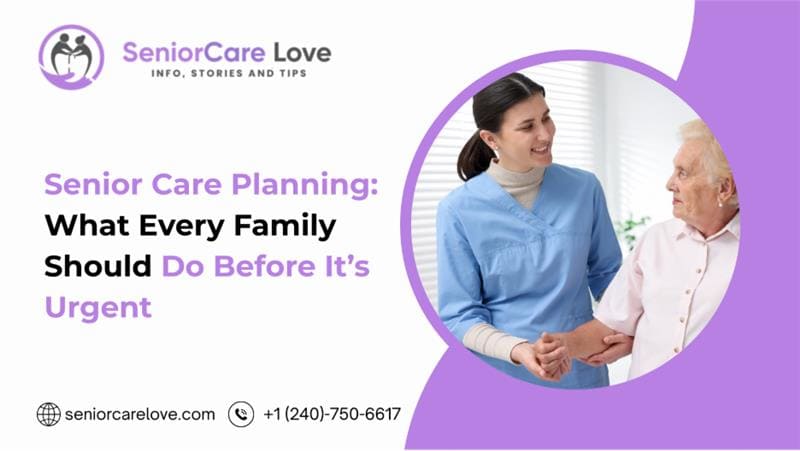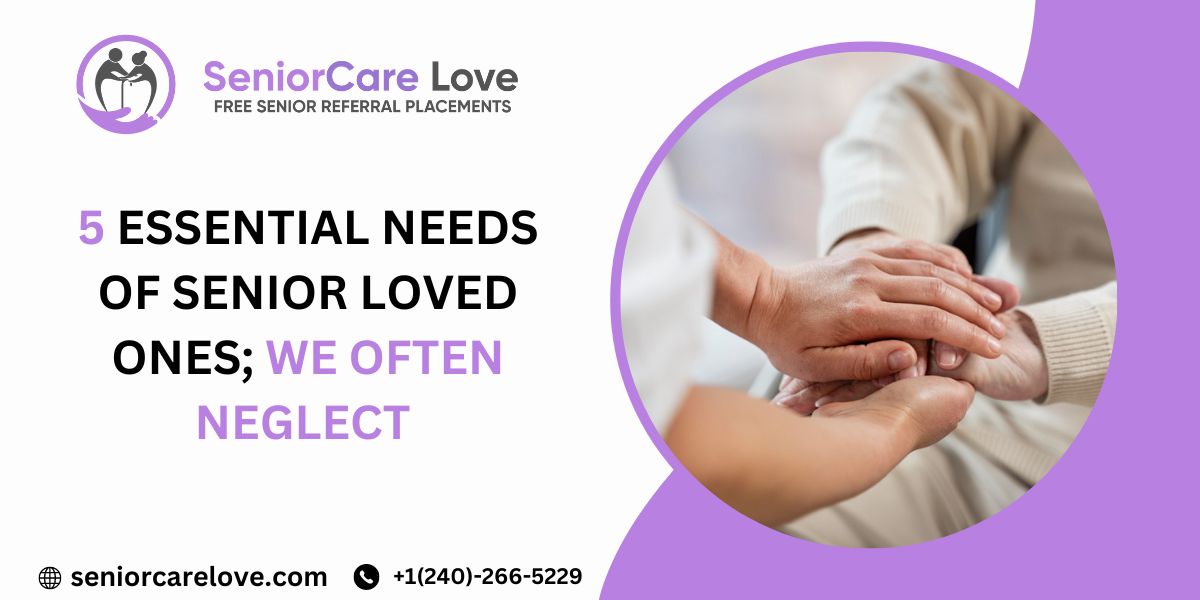There’s something oddly universal about how families avoid talking about senior care.
You could be mid-way through Thanksgiving dinner, talking about nothing more serious than stuffing recipes, and the second someone says “power of attorney” or “long-term care,” the whole table suddenly becomes very interested in cranberry sauce.
And listen, we get it. It’s not exactly the feel-good topic of the year. But here’s the truth bomb: planning for senior care before it’s urgent is one of the most loving things you can do.
At Senior Care Love, we’ve helped families who were ready (bless them), families who thought they were ready, and families who were Googling “what even is assisted living” in the ER parking lot at 1:13 a.m. You don’t want to be that last group. Trust us.
So let’s talk about it—gently, humorously, and with no shame. Because this stuff? It matters.
Why Planning Ahead Matters (A Lot)
If you’ve ever tried to:
- Get a medical directive signed when your loved one is already sedated
- Explain Medicaid asset transfers in a hospital hallway
- Tour memory care communities with no idea what you’re even looking for
…then you already know the answer.
Crisis-mode planning tends to lead to:
- Rushed decisions
- Costly mistakes
- Emotional burnout
- Sibling feuds (usually about Mom’s casserole dish and her bank account)
Proactive planning, on the other hand, buys you:
- Time to explore the right options
- Peace of mind for the whole family
- Clear communication around your loved one’s wishes
- The ability to act—not just react
The Signs It’s Time to Start (Hint: It’s Not Just a Fall)
Still unsure if it’s time to start “the conversation”? Look for:
- Increasing forgetfulness or confusion
- Medication mix-ups
- Isolation and loneliness
- Unsteady walking or unexplained bruises
- Changes in hygiene, eating, or household cleanliness
- You, losing sleep over what might happen next
Here’s our rule of thumb: if you’re asking whether it’s time—it’s time. Waiting until it’s urgent rarely ends with warm fuzzy feelings.
What Every Family Should Do Now (Yes, Now)
Even if your loved one is “fine” and still grilling burgers like it’s 1985, these are the steps you can—and should—take ahead of time.
1. Start the Conversation (Early and Often)
No one enjoys talking about decline, dependency, or that one aunt who thinks every nursing home is a scam. But avoiding the conversation only guarantees panic later.
How to start:
- Use recent events: “I read about a neighbor who had a stroke and wished she had a plan…”
- Frame it around their wishes, not your worries
- Use humor if it fits: “Let’s write down your wishes before you end up stuck with me choosing your roommate.”
2. Get the Paperwork in Order (Don’t Worry, We’ll Walk You Through)
It sounds boring—and it is—but it’s also critical.
Must-haves:
- Durable Power of Attorney (POA) – for finances
- Healthcare Proxy or Advance Directive – for medical decisions
- HIPAA release form – so doctors can legally talk to you
- Will – even a basic one
- List of medications, doctors, and insurance info – updated yearly (monthly, if you’re Type A)
One family told us they had “all the paperwork handled” until we asked where it was. Turns out it was in a locked file cabinet—behind three boxes of VHS tapes—with no one else knowing the key code. Don’t be them.
3. Talk About the Money (Sorry, But You Have To)
We know. No one wants to discuss money, especially in families where Great-Aunt Ruth still hides cash in Tupperware.
But you need to know:
- What assets exist (home, savings, insurance policies)
- Whether there’s long-term care insurance (and what it actually covers)
- How much monthly income comes in—and goes out
- If Medicaid planning is needed (spoiler: start 5 years ahead)
If the idea of this conversation makes you sweat, bring in a third-party advisor (we know a few). Neutral, informed voices can make all the difference.
4. Learn the Local Landscape (Hello, DC and Maryland Care Maze)
Every region is different. In the DC–Maryland area, you have access to:
- Top-notch hospitals and specialists
- Incredible in-home care agencies
- Assisted living communities with actual waitlists (yes, they exist!)
- Medicaid Waiver programs (with very specific eligibility rules)
- VA Aid & Attendance benefits (if your loved one served)
But here’s the thing: you have to know what’s available before you need it. Touring a memory care facility in a snowstorm is no one’s idea of a good time.
5. Create a Care Circle (Because One Person Can’t Do It All)
You might be the go-to child/spouse/friend/neighbor now—but you shouldn’t be the only one.
Start a care circle:
- List out everyone who can help (including distant cousins who owe you a favor)
- Assign tasks: finances, transportation, companionship, meal drops
- Use shared calendars or care apps to stay organized
- Schedule regular check-ins (no, “checking the group chat” doesn’t count)
And if no one steps up? Hire support before you burn out. Your sanity is worth the investment.
Personal Anecdote: The Spreadsheet That Saved Thanksgiving
A few years ago, we worked with a family in Silver Spring—four adult siblings, all emotionally allergic to planning. They only reached out after Dad had a minor stroke and the hospital asked about POAs.
Cue: panic.
We helped them create a shared care plan. One daughter managed meds and doctor appointments. The son in Seattle handled bills. A local niece helped with meals and visits. And yes—they made a spreadsheet. (Color-coded. With tabs.)
Thanksgiving that year? Peaceful. Functional. Even a little joyful.
Why? Because no one had to guess what came next. They just followed the plan.
Final Thought: Hope Is Not a Plan—But Love Can Be
At Senior Care Love, we always say: hope is lovely—but not a care strategy.
Planning doesn’t mean something bad is happening. It means you’re preparing to protect what’s already good: connection, dignity, calm, and love.
So make the plan. Fill out the paperwork. Tour the community (even if just for “research”). Put the binder together. Save the spreadsheet.
Because one day—not far from now—you’ll be so glad you did.
And when that day comes, and a nurse looks at you and asks, “Do you have her directive?”—you’ll smile, pull out the folder, and think, we’ve got this.
Need help starting your family’s senior care plan in DC or Maryland?
We’re here. No pressure, no judgment, no clipboards unless you really want one.
Reach out today — we’ll make it easier (and maybe even a little funny).
FAQs About Senior Care Planning
Q: When is the right time to start planning for senior care?
A: Ideally, before there’s a medical crisis. If your loved one is 70+, lives alone, or has a chronic condition—it’s time to start.
Q: What’s the difference between assisted living, home care, and nursing homes?
A:
- Home care: support comes to the house (bathing, meds, meals)
- Assisted living: apartment-like settings with built-in support
- Nursing homes: 24/7 medical care for complex needs
Memory care can be part of either assisted living or nursing home levels.
Q: Is this all covered by Medicare?
A: Not really. Medicare covers short-term rehab and medical needs—not long-term housing or personal care. Medicaid and private pay are the most common sources for long-term care.
Q: What if my family doesn’t agree on what’s best?
A: Join the club. Use a care advisor or neutral third party to mediate. Focus on shared values and the elder’s preferences—not family politics.
Q: Do I need an elder law attorney?
A: For Medicaid planning, POAs, and trusts? Yes, absolutely. A one-time legal consultation can save years of stress.







